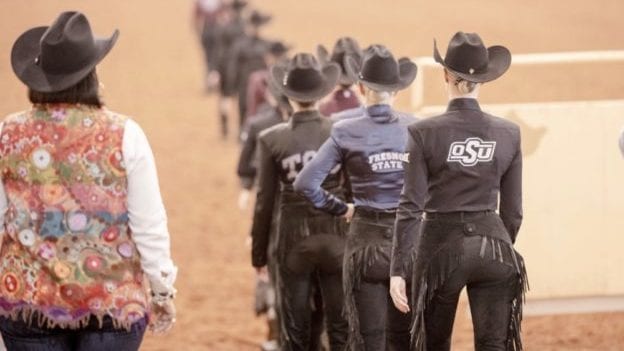College is a time of uncertainty and doubt for everyone, and especially for equestrians. While most sports end once you graduate high school, riding and showing horses can be different.
There are almost too many options to continue riding in college. As college application season approaches, what factors should you consider?
We asked some NCEA and IHSA riders and coaches this very question.
Understand what’s out there.
 There’s a vast difference between studying and riding horses. “Riders have many options to choose from,” Albion College coach Adam D’Agostino said. “There are several schools that offer equine science, business, and studies programs that offer riding programs outside of IHSA. Riders also have other choices that don’t involve studying equine, like NCEA, Rodeo, and Ranch Horse teams.” There are many schools, like the University of Findlay, Cazenovia College, or the University of Kentucky, that offer either equine science, equine business, or other majors involving equines.
There’s a vast difference between studying and riding horses. “Riders have many options to choose from,” Albion College coach Adam D’Agostino said. “There are several schools that offer equine science, business, and studies programs that offer riding programs outside of IHSA. Riders also have other choices that don’t involve studying equine, like NCEA, Rodeo, and Ranch Horse teams.” There are many schools, like the University of Findlay, Cazenovia College, or the University of Kentucky, that offer either equine science, equine business, or other majors involving equines.
There are also a growing number of schools with varsity and club programs for riders. Currently, there are 17 Division 1 teams in the National Collegiate Equestrian Association(NCEA), according to their website. The NCEA is unique in its format. There are four different events: horsemanship, reining, equitation on the flat, and over fences. Five riders from each team draw from five different horses for each event. They compete, going head-to-head riding the same horse on the same pattern, with each pattern receiving a score. Whoever gets the highest score gets the point. One big plus to NCEA is that most schools within it are supported and funded by their universities and can give out scholarships.
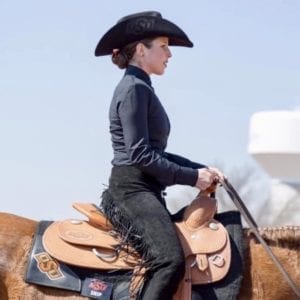 “I wanted to continue riding at the top level in college, and NCAA provides that opportunity,” Oklahoma State University’s Harley Huff said. “I love the challenges of traveling to these different schools, only being able to warm up on the horse I drew for four minutes and then having to go out and make the best pattern that I can. I like the head-to-head matchups on the same horse because you can see what the other rider figured out on that horse better than you or see how well you got through the pattern better than they did.”
“I wanted to continue riding at the top level in college, and NCAA provides that opportunity,” Oklahoma State University’s Harley Huff said. “I love the challenges of traveling to these different schools, only being able to warm up on the horse I drew for four minutes and then having to go out and make the best pattern that I can. I like the head-to-head matchups on the same horse because you can see what the other rider figured out on that horse better than you or see how well you got through the pattern better than they did.”
Another option to ride collegiately is the Intercollegiate Horse Show Association (IHSA). The format is similar to NCEA, but allows for more riders to compete, no matter their experience.
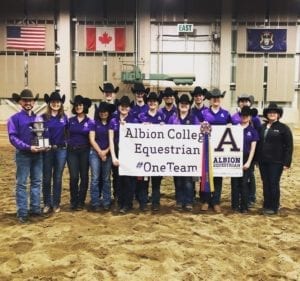 “IHSA is a great organization because it offers many different levels for riders and the opportunity to advance in divisions through competing,” Coach D’Agostino said. It has multiple divisions, ranging from Walk/Trot to Open. There are opportunities to compete in both English and western events. At some colleges, IHSA is a varsity sport and is funded like one. But at a lot of other schools, it is a club sport, allowing for more riders to compete at their own expense.
“IHSA is a great organization because it offers many different levels for riders and the opportunity to advance in divisions through competing,” Coach D’Agostino said. It has multiple divisions, ranging from Walk/Trot to Open. There are opportunities to compete in both English and western events. At some colleges, IHSA is a varsity sport and is funded like one. But at a lot of other schools, it is a club sport, allowing for more riders to compete at their own expense.
“IHSA is unique in that you not only compete individually but also as a team,” Arizona alumna Emma Koprowski said. “Getting to ride a variety of horses and learning to adapt to everyone is a challenge I appreciated and one that helped me to build skills to become a well-rounded rider.”
Finally, there’s the option of not riding collegiately at all. If you have the means to keep riding and showing your horse through college, then go for it. Sometimes, choosing this route can keep more of your time open for classes, since riding on a team has other time commitments, like practice, conditioning, meetings, and working shows.
Morgan Bailey, a sophomore at Michigan State University, decided to switch to this route.
“I rode for the University of Findlay last year as a freshman,” she said. “Being an underclassman on a primarily upperclassmen team was intimidating, and at times, it was hard to balance school and practice/events. I decided to focus my time on going to school and showing my horse. But in the end, I learned so much, and it made me a better rider.”
Decide what type of college riding experience you want.
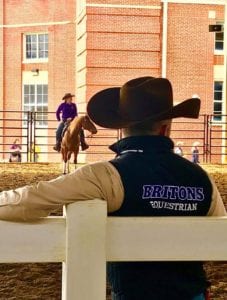 After you know your options, you have to choose what you want your college experience to entail. The first thing to decide: do you want to study horses, or ride them? Or both? If you want to study them and make a career out of riding, then find a school with an active equine studies program that fits you. If not, there are plenty of schools that have NCEA or IHSA teams that can keep you showing through college. Or, maybe you want to show your horse.
After you know your options, you have to choose what you want your college experience to entail. The first thing to decide: do you want to study horses, or ride them? Or both? If you want to study them and make a career out of riding, then find a school with an active equine studies program that fits you. If not, there are plenty of schools that have NCEA or IHSA teams that can keep you showing through college. Or, maybe you want to show your horse.
Another factor to consider – being on a team. Riding is an individual sport, and that’s what some people enjoy about it. But, being on a team and riding for your teammates can push you to be a better rider.
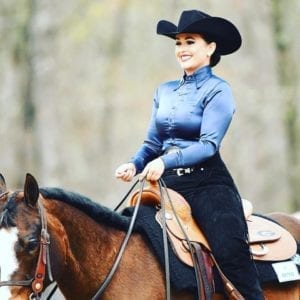 “You have to decide whether or not you want to be on a team,” Auburn University Equestrian’s coach Greg Williams said. “There are NCEA teams; there’s a bunch of IHSA teams too. There are opportunities for them to do it, but it’s just whether they want that team. Because they can ride on their own, they can ride in some major events, without riding on a team. The bottom line is if they want the team experience or not. A lot of people think they can do it, but being able to put 39 other girls ahead of yourself and succeed, that’s a big accomplishment. It takes a special person to buy into that.”
“You have to decide whether or not you want to be on a team,” Auburn University Equestrian’s coach Greg Williams said. “There are NCEA teams; there’s a bunch of IHSA teams too. There are opportunities for them to do it, but it’s just whether they want that team. Because they can ride on their own, they can ride in some major events, without riding on a team. The bottom line is if they want the team experience or not. A lot of people think they can do it, but being able to put 39 other girls ahead of yourself and succeed, that’s a big accomplishment. It takes a special person to buy into that.”
Joining a collegiate equestrian team, whether it be IHSA or NCEA, also can provide a rider with extra support, especially with such a big transition in front of them.
“The team I was on at the University of Arizona was just so fun to be involved with in general,” Koprowski said. “We were like a family, so traveling and showing horses with them was fun.”
Be the type of rider and student that programs want.
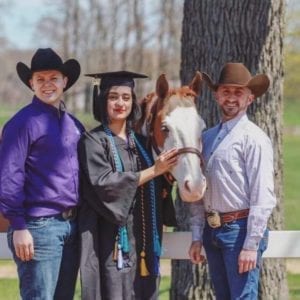 “[We’re looking for] a rider with a strong work ethic, time management skills, and a sense of personal accountability,” Coach D’Agostino said. “Each program is unique and demands different things of their riders, but participating in a sport while in college is a balance of those things.”
“[We’re looking for] a rider with a strong work ethic, time management skills, and a sense of personal accountability,” Coach D’Agostino said. “Each program is unique and demands different things of their riders, but participating in a sport while in college is a balance of those things.”
Coaches want to make sure that they are recruiting girls who they can depend on. Joining a team is a huge commitment, and you have to reflect and ask yourself if you’re willing to make it.
“Are you willing to make the time commitment and work hard?” Bailey said. “Can you balance things well and have good time management skills? Are you willing to sacrifice the cliche “college party lifestyle” for the betterment of the team?”
Reach out to college programs.
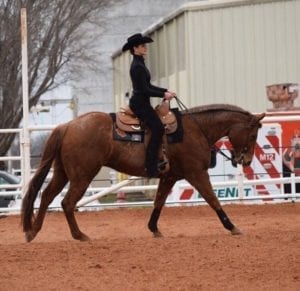 The next step to take is to break down which colleges fit you. Do your research, and see what options are out there. It’s as easy as looking on the NCEA or IHSA websites to see what programs each school has.
The next step to take is to break down which colleges fit you. Do your research, and see what options are out there. It’s as easy as looking on the NCEA or IHSA websites to see what programs each school has.
“Visit as many schools as you can,” Huff said. “They’re all different, and each one has something different to offer.”
If you want to join a team, make sure to reach out to the coaches. Especially with NCEA teams, since they have a limited number of slots.
“Keep in contact,” Erica Snyder, a rider at the University of Tennessee at Martin, said. “Keep emailing and sending videos on as many different horses as you can.”
Another great way to get noticed: camps put on by the teams.
“For a lot of people, it takes a lot to get noticed sometimes,” Coach Williams said. “We use our camps and clinics very heavily. That’s how we can see riders on different horses.”
Simply getting your name in the coach’s mind can make a world of difference when it comes time for signing and deciding where you will end up.
Prepare yourself for your path.
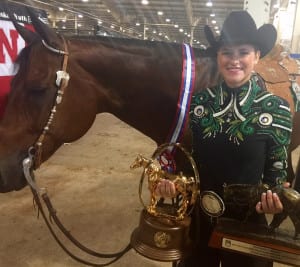 College riding programs are rigorous, whether you’re on a team or studying it. As college approaches, anticipate it and prepare.
College riding programs are rigorous, whether you’re on a team or studying it. As college approaches, anticipate it and prepare.
“Ride as many different types of horses as you can,” Huff said, “so you can be somewhat prepared for what college horses are like. Riding in college isn’t the same as riding in the industry, and the sooner you figure that out, the better off you’ll be. There’s no such thing as a perfect horse in collegiate riding, but when you come out of the arena having one of the best patterns on a tricky horse, it is one of the best feelings.”
One piece of advice that every collegiate rider gave: be open-minded.
“Every rider can continue to improve and learn,” Bailey said. “There is no cap on that. Becoming an IHSA rider proves that in every way. If you’re willing to work hard, you can take your riding to levels that you never thought it could be at.”
Snyder thought the same about NCEA.
“Making sure you’re able to be open to new styles of coaching and challenges of riding many different horses is important if you want to be successful in an NCEA setting,” she said.
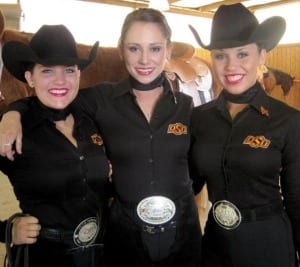 Ultimately, pick something that makes you happy.
Ultimately, pick something that makes you happy.
College is an exciting time when most get to discover themselves and what they want to do for the rest of their lives. Don’t settle. Pick somewhere that you enjoy. Make sure that the people surrounding you are the people you want to be with.
“My coaches are awesome, and you can go to them for anything,” Huff said. “The girls on the team are close to each other; we’re like a family.”
It’s up to you to decide what your college riding career will look like, and while it can be scary, it can be one of the best decisions of your life.
“Consider all of your options whether it be NCEA, IHSA or continuing to ride at your barn,” Snyder said. “Pick what’s right for you and what makes you the happiest.”
Resources:
NCEA’s Website and Team Recruitment Questionnaires: https://collegiateequestrian.com/index.aspx
https://collegiateequestrian.com/sports/2019/4/3/_131987884491180273.aspx
IHSA’s Website: http://www.ihsainc.com/home


